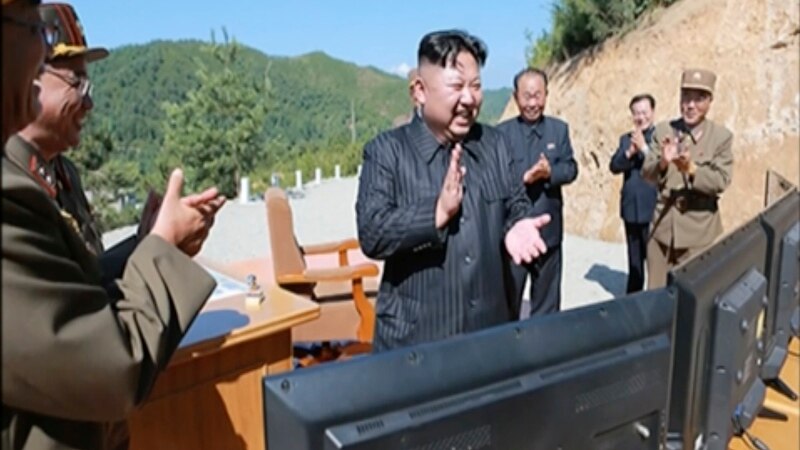North Korean Missile Was 'Not One We've Seen Before'

The intercontinental ballistic missile North Korea successfully tested this week is "not one we have seen before," the U.S. Defense Department said Wednesday, describing its immediate threat to the United States as "limited."
Pentagon spokesman Captain Jeff Davis said, "We have still not seen a number of things that would indicate a full-up-threat." He noted that in a successful test last month, a U.S.-based missile interceptor knocked down a simulated incoming North Korean ICBM.
Davis said the missile Pyongyang tested Tuesday was capable of flying more than 5,500 kilometers (3,400 miles), a long-enough range to pose a threat to Alaska, the northwesternmost U.S. state, but not the 48 contiguous states further to the south or the Pacific island state of Hawaii.
The Defense Department assessment came as North Korean leader Kim Jong Un boasted about the missile launch. He told a group of scientists and technicians that the United States would be "displeased" to receive what he called "a package of gifts" as it celebrated its annual Independence Day holiday on Tuesday, according to the regime's Korean Central News Agency.
39-minute flight
North Korea launched the missile, dubbed the Hwasong-14, from an airport near its border with China. The North's Academy of Defense Science said the Hwasong-14 traveled 933 kilometers (580 miles) and reached an altitude of 2,802 kilometers (1,740 miles). The missile splashed down in the Sea of Japan after a 39-minute flight.
Based on analysis of the steeply angled trajectory the rocket followed, U.S. experts said the missile appeared to have a range that would enable it to reach Alaska.
KCNA said Kim, wearing "a broad smile on his face," urged his scientists to "frequently send big and small 'gift packages' to the Yankees."
U.S. Secretary of State Rex Tillerson issued a statement confirming the North's missile test, which he said "represents a new escalation of the threat to the United States, our allies and partners, and the world."
Tillerson said global action was needed to stop the threat posed by Pyongyang. He said any nation that hosted North Korean guest workers, provided the North with economic or military benefits, or failed to carry out U.N. resolutions against Pyongyang was "aiding and abetting a dangerous regime."
Council session
Dana White, the Pentagon's chief spokesman, issued a statement saying Tuesday's missile test "continues to demonstrate that North Korea poses a threat to the United States and our allies."
A spokesperson for U.N. Secretary-General Antonio Guterres issued a statement condemning Pyongyang, saying its missile test was "yet another brazen violation of Security Council resolutions and constitutes a dangerous escalation of the situation."
The U.N. Security Council set an emergency, closed-door meeting on the North Korean matter for late Wednesday, and Tillerson said there would be stronger measures taken against the North.
In South Korea, U.S. and South Korean forces said they carried out an offensive missile exercise hours after the North Korean launch, intended to counter "North Korea's destabilizing and unlawful actions."
"The U.S. commitment to the defense of the ROK [Republic of Korea] in the face of threats is ironclad," a joint statement said.
The spot in the Sea of Japan where the Hwasong-14 splashed down lay in Japan's special economic zone, angering not only Tokyo but also China, which appears to be failing to keep its ally in check.
VOA's Jeff Seldin, Joyce Huang and Saibal Dasgupta contributed to this report.

0 Response to "North Korean Missile Was 'Not One We've Seen Before'"
Posting Komentar